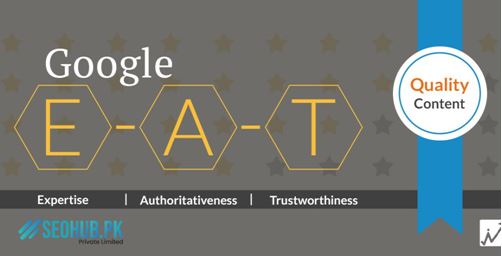Google’s search quality guidelines known as E-A-T which stands for Expertise, Authoritativeness, and Trustworthiness have been expanded to include an additional “E” for Experience. This updated acronym is now called E-E-A-T. While E-A-T has long been an important factor in influencing Google’s search rankings, the addition of Experience helps emphasize the value of content created by those with direct involvement or practical familiarity with a topic.
In this blog post, I will provide an in-depth guide to understanding E-E-A-T and how it can impact your SEO efforts. We’ll explore what each element of E-E-A-T means, why it’s important, and tips you can implement to demonstrate higher levels of E-E-A-T for your website and content. By focusing on these quality guidelines, you can create more helpful content for users and see benefits in search engine rankings over time.
What is E-E-A-T?
Let’s start with breaking down what each letter in E-E-A-T stands for:
- Experience – Relates to having practical and first-hand involvement with the subject matter being discussed. Content creators can showcase their experience by relating real-life examples and scenarios.
- Expertise – Refers to the demonstrated level of skill and knowledge on a topic. Expertise can come from professional qualifications, extensive research, or simply developing practical know-how over time.
- Authoritativeness – Considers how recognized a person, website, or company is as a credible source within their industry or field of topic. Authoritativeness develops through experience, expertise, and other brands or entities linking to and endorsing their content.
- Trustworthiness – Google views trustworthiness as the foundation of E-E-A-T. It relates to reliably sourcing information, avoiding conflicts of interest, and maintaining transparency about sources and accuracy.
So in summary, E-E-A-T evaluates the quality of content based on how experienced, knowledgeable, respected, and trustworthy the content creator is on the topic they are discussing. Proving these attributes helps Google determine if information will be valuable for users.
Why is E-E-A-T Important for SEO?
While E-E-A-T itself is not a direct ranking factor, demonstrating these qualities in content can positively influence a site’s performance and visibility in search engines over time in a number of ways:
- Users Trust Information from Experts – Search engines aim to provide users with reliable information to satisfy their needs. Content that demonstrates real-world experience and authority from qualified sources matches these user expectations.
- Aligns with User Intent – By focusing on authority and trustworthiness, E-E-A-T aligns with how people naturally assess credibility when researching important topics online or in real life. This helps search engines surface the most suitable pages.
- Influences Related Ranking Signals – Aspects like content quality, user experience, and Domain Authority/Expertise are still important ranking factors that can be enhanced through high E-E-A-T practices. Well-optimized E-E-A-T supports other technical SEO elements.
- Persists Algorithm Updates – While Google’s algorithm evolves, E-E-A-T remains a constant standard referenced across all updates. Adhering shows you understand users’ and Google’s core priorities for discovery and information.
Therefore, thinking of E-E-A-T as a benchmark can help evaluate how well your site and content serves searchers. Take time to nurture expertise, build rapport with users, and maintain informational standards through E-E-A-T best practices.
Levels of E-E-A-T
When considering your progress in achieving higher E-E-A-T, it helps to understand that this quality concept exists on a spectrum. Google’s search quality guidelines provide insights into the different levels sites may demonstrate:
Lowest E-E-A-T
- Purpose appears deceptive, harmful, or to manipulate users
- Poor website reputation
- Minimal information about owner/authors
- Obstructing primary content
Lacking E-E-A-T
- Writer lacks relevant experience on topic
- Writer lacks expertise or qualification on topic
- Writer/site is not an authority on the topic
- Lacking transparency for users
High E-E-A-T
- Original, in-depth content aligned to topic
- Expert, qualified authors
- Authoritative industry websites
- Satisfies primary user intent
Very High E-E-A-T
- Unique, investigative reporting/research for news
- Highly skilled creative works for arts
- Comprehensive, evidence-based data
- Content is reliably useful to the specific field
The goal is always progressing content higher in quality and relevance for searchers through diligent efforts in Experience, Expertise, Authoritativeness, and Trustworthiness over time.
Tips for Achieving Higher E-E-A-T
Here are some practical tips any website can implement to steadily improve their E-E-A-T levels:
Consider Page Experience
Focus on load speed, accessibility, minimal distraction, clear navigation to promote positive user interactions. This aligns with what Google values under E-E-A-T.
Showcase Your Team’s Experience
Create an About or Team page with staff bios highlighting credentials, focus areas, success stories, and qualifications to convey authority on subjects.
Build Topical Content Clusters
Publish multiple in-depth articles under related sub-sections to demonstrate expert-level knowledge covering all aspects of a topic through topical authority.
Link to Reputable Sources
Cite official reports, research studies, and expert websites to show information is backed by wider consensus and acceptance of facts and ideas.
Encourage User-Generated Content
Prompt happy customers to share photos, reviews, and brand mentions across social platforms to build organic endorsements and support E-E-A-T.
Maintain Technical Standards
Keep your site well-optimized, secure, accessible, free of technical issues, and maintain technical SEO best practices for positive user experience factors.
Collaborate with Industry Experts
Contributions, quotes, guest posts from notable professionals within your space enhances credibility while helping experts too through exposure and links back.
Establish Authority off-Site
Guest blogging for other authority sites, contributing to industry publications or reference works raises online reputation and trust for content over time.
Update Regularly
Show ongoing involvement to maintain relevance for ongoing or recurring queries through continuous publishing of new and refreshed content.
By implementing these practices systematically, any website can steadily progress towards expressing stronger E-E-A-T through helpful, authentic and trustworthy information for search users and engines over the long-term.
The combination of real-world experience, demonstrated expertise, established reputation, and maintained trustworthiness that defines E-E-A-T has always been important for content and websites, and will likely remain a core quality signal for Google. By focusing efforts on continuously enhancing E-E-A-T attributes for your site over time through technique and care, you support both users and search rankings in gaining and retaining online relevance. With diligence, even fairly new websites and content creators can make progress in this area.
“We’re a trusted digital marketing company offering great SEO services in Pakistan and website development service in Pakistan, check out our website for affordable options that fit your needs.”
People also ask:
What are the key benefits of achieving higher E-E-A-T for a website?
Higher E-E-A-T helps build user trust in your content, which boosts engagement metrics like time on site and number of pages viewed. It can also positively influence related SEO signals over time by demonstrating your expertise on topics provides value. Proving E-E-A-T guides you towards properly identifying and serving searcher needs through high-quality, authentic information sources.
How long does it typically take for a website to demonstrate higher levels of E-E-A-T?
The time commitment varies depending on your starting point and resources. But as a guideline, most site owners will need 12-18 months of ongoing effort publishing fresh, insightful content while engaging online communities to meaningfully progress authority and begin influencing rankings. Leveraging expertise across mediums simultaneously can accelerate results. Consistency is important to nurturing E-E-A-T long-term.
What are some specific content types that help strengthen a site’s E-E-A-T?
Different mediums each appeal to varied audiences based on topic, Search intent and device. Video, podcasts, ebooks even visual/interactive tools all amplify authority if produced expertly alongside standard articles. User-generated reviews and case studies realistically portray experience that text alone cannot by directly involving customers in building trust as experts.
If I’m new to a topic, how can I demonstrate sufficient expertise to achieve E-E-A-T?
Being an novice is normal when venturing into new waters. Relying on accredited sources in your initial research, and deferring as needed to industry professionals is prudent until gaining hands-on familiarity over time. Providing transparent disclosures helps establish credibility before expertise takes root. Emphasizing practical lessons learned also engages more experienced readers in furthering their own skills through sharing insights gathered.
Should I include author profile/biography information on every page?
Detailed bylines reinforce Expertise especially on signature pieces but including brief 3-5 line introductions consistently helps establish familiarity with visitors needing context for each contribution. Introducing yourself uniquely on every page could also become repetitive if identical information is reused across content. Strike a balance highlighting strengths relevantly without distracting from primary focus of each individual piece.
Does the E-E-A-T level of individual pages or the entire site matter more?
Both holistic site-wide standards and fine-tuning article quality works in tandem. Overall positive reputation from consistent user experience reinforces pages focusing keenly on demonstrating skills. But single articles lacking E-E-A-T attributes specific to their immediate subject will damage perception even when offset by other assets achieving success separately. Reciprocity between micro and macro nurtures ratings progressively across any profile over time.
How can I achieve higher E-E-A-T levels if my budget does not allow hiring industry experts?
Authentic expertise evolves from voracious study and real-world practice, not titles alone. Crowdsourcing by collaboratively engaging like-minded peers to mutually further discussion encourages greater learning than working entirely alone could. As communities expand, emerging leaders naturally emerge whom others recognise, respect and follow based on demonstrated experience over time, even without formal qualifucations. Thought leadership cultivates naturally through service.
Is securing backlinks still important for E-E-A-T when users do not actually see them?
While invisible to searchers, backlinks serve an evidentiary role for raters by signaling reputation among influential sources. Their nature, topic relevancy alongside keywords anchored also aid assessing whether referring pages specifically recognize topics authoritatively discussed. Link profiles alone do not dictate E-E-A-T ratings directly which emphasis validity, transparency and delivering genuine value to users primarily. Links circumstantially support appraisals from impartial outsiders weighing input quality holistically across all criteria.
How heavily are new domains or sites penalized for lower levels of E-E-A-T?
Newcomers naturally lack tenure advantages. But search engines aim to fairly judge latest arrivals against incumbents based strictly on merit, not bias towards longevity alone. Emerging talent showing steady, rapid improvement indicates potential and work ethic worth encouragement too. Page history holds diminished bearing if a site owner proves capable of learning key lessons and applying feedback productively to author truly authoritative works expeditiously. Consistent quality prevails over chronology given sufficient initial effort investment.
How important are multimedia elements like images and videos for E-E-A-T?
Visuals raise user engagement naturally by appealing through multiple senses concurrently. Videos authentically share experience by directly demonstrating techniques discussed or products reviewed. Photography expressing relatable emotions resonate empathetically beyond dry descriptions alone. But as participatory teaching aids augmenting written works primarily, rich media supports without replacing traditional formats central to authoritativeness as Google’s evaluative guidelines concentrate chiefly on content substance foremost when determining E-E-A-T directly.
What types of sub-optimal pages can undermine an otherwise high E-E-A-T site?
Pages serving chiefly promotional instead of informational mandates especially risk detracting from otherwise positive reputations. Stale pages becoming obsolete over time also diminish the validity of associated brands if reputations rest upon perpetually useful advice alone. Functional errors lowering usability such as slow loading or navigability issues, inaccessibility due to obsolete codes undermine trustworthiness too if impacting representative samples of overall operations and libraries significantly enough. Risks remain contained through balanced, regularly maintained portfolios.
How can local businesses not selling online achieve credible levels of E-E-A-T?
Community involvement, openhearted lessons from own trials assisting others as mentors regionally cultivate goodwill. Publishing client testimonials preserves privacy while persuasively demonstrating quantifiable results to convince wary prospects. Regional authorities like chambers of commerce may officially recognize notable small ventures through awards. Local media word-of-mouth coverage boosts name awareness amongst those served directly within physical proximity daily. Consistent charitable donations cultivate favorable repute online mirroring real-world esteem accrued locally.
Does failing to prove one letter undermine achieving the entire E-E-A-T standard?
Each pillar reinforces others reciprocally so overlooking individual attributes inhibits overall progress potentially. But Google aims for nuanced, multi-factorial evaluations above simplistic scoring alone so isolated deficiencies may be offset through disproportionately developed complementary strengths depending on the specific page, topic and intent. Maintaining balanced progress across all five indicators optimizes ratings, while persevering holistically usually surmounts any deficits arising periodically along maturation journeys inevitably involving experimentation and occasional missteps affecting singular works.
How can E-E-A-T help protect against unexpected algorithm changes?
Authentic expertise cultivated earnestly through genuine passion for assisting targeted communities resists manipulation attempts more durably than transient popularity reliant on external factors alone. Understanding user needs profoundly nurtures lasting relationships preserving relevance stability. Continuous improvement guided by consistent feedback circulating reinforces authority naturally amid fluctuations since priorities emphasize dependable assets throughout evolution. Centering strategy around serving users first prioritizes sustainable success founded on intrinsic worth endowing resilience against volatility.
If I outsource site operations or content creation, how can I verify E-E-A-T standards?
Thorough vetting establishes contractors’ credentials beforehand while oversight evaluates outputs periodically to safeguard entrusted reputations. Insist providers cite information sources transparently and freely admit limitations candidly instead of overclaiming abilities artificially. Monitor representative sampling continuously and address issues constructively through open communication sustaining healthy partnerships founded upon mutual understanding and accountability. Outsourcing complements rather than replaces diligent quality assurance remaining ultimately an internal enterprise foremost.
Should I prioritize specific query intent types when optimizing for E-E-A-T?
Prioritizing recognizable buyer intent catalyzes visibility and engagement by serving forefront concerns most urgently. But aim comprehensiveness addressing full buyer journeys through every stage ultimately as search habits evolve fluidly depending on countless dynamic variables singly out of any publishers control. Holistic, helpful portfolios thoughtfully assembled meet unexpected curiosities serendipitously through depth complementing focus usefulness sustaining E-E-A-T relevance universally. Balance specificity enriching entry points accessibly alongside immersive landscapes inviting explorations intrinsically rewarding discoveries.
Does the site owner’s reputation factor into their site’s potential to achieve E-E-A-T?
Any online presence reflects upon connected brands associatively for better through dedication and worse through negligence so web owners set tone establishing expectations. But sites standing independently based upon internal operations merit standing impartially according to individual merits regardless external relationships potentially complicating reputational transference. Likewise, sites owned by larger companies remain appraised discretely upon standalone virtues since businesses remain distinct notwithstanding potential affiliations or common management which cannot transfer achievements or liabilities either positively or negatively without discretionary, case particular evaluations.



